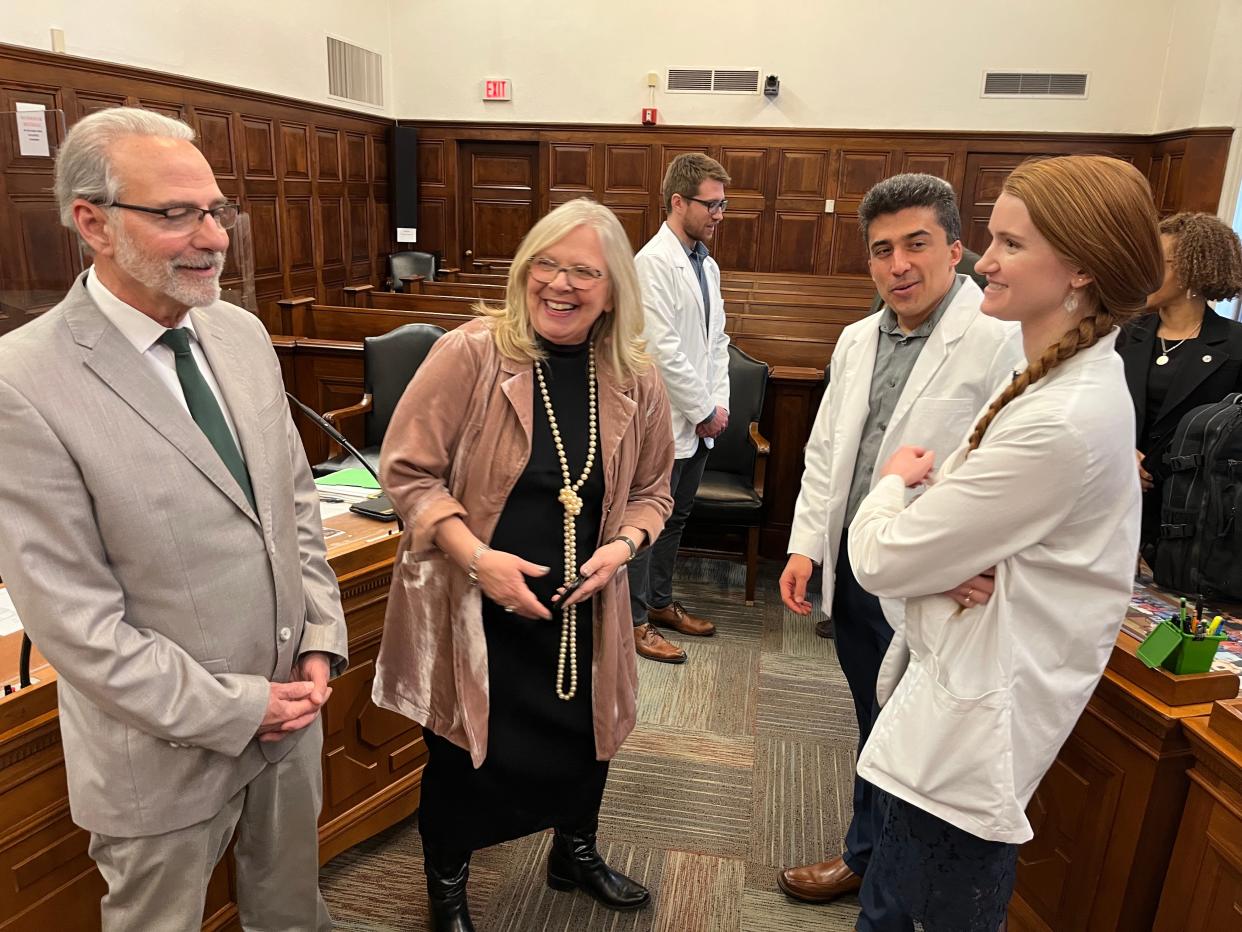Akron City Council pushes mayor to fund medical debt relief program for residents

Akron City Council unanimously and swiftly passed a resolution Monday urging the mayor to fund the proposed eradication of tens of millions of dollars in medical debt held by thousands of residents.
With Mayor Dan Horrigan on board, Akron would join a growing number of Midwestern cities partnering with RIP Medical Debt, a New York nonprofit that negotiates and buys consumer medical debt held by hospitals and other health care providers.
Unlike traditional debt collectors, RIP forgives the outstanding medical bills or late fees. The goal isn't to make money but to provide relief. People who earn no more than 400% of the federal poverty line ($111,000 for a family of four) and carry medical debt equal to 5% or more of their annual income would simply get a letter in the mail without having to ask for the help.
RIP Medical Debt explained:Some Ohio cities are erasing their residents' medical debt. Here's how it works
“I want you to just close your eyes and imagine what it would be like after you’ve endured cancer treatment, after you have gone through a difficult childbirth or long-term care of a sick family member,” said Ward 1 Councilwoman Nancy Holland, who brought the idea to her colleagues on council. “Imagine the feeling of opening the letter and it says, ‘We’ve retired your medical debt.’”
For every dollar Akron invests in the plan, RIP estimates it could eliminate $100 in privately held debt, potentially stretching one-time federal pandemic money further than anything the city has done so far with its $145 million American Rescue Plan Act allocation.
Medical debt relief in Akron:Some Akron leaders want to erase medical debt for residents. Will politics stall the aid?
By erasing medical debt, proponents argue that residents could afford basic expenses like food and shelter or make the kind of purchases that help families grow. Or they could again seek preventative and regular health care at a doctor's office without fear of running into a bill collector in the parking lot.
The idea came to Holland from a group of second-year students at Northeast Ohio Medical University — Max Brockwell, Emily Huff, Michael Massey and James Moore. The leaders in their local chapter of the Students for a National Health Program sat in the front row of City Council on Monday afternoon as Holland painted a picture for her colleagues.
Akron council members quickly sign on to medical debt relief
It wasn’t a hard sell for Ward 9 Councilman Mike Freeman. As chair of council’s Budget and Finance Committee, he looked over at the students and wondered if they'll ever help so many people in their entire medical careers.
“You’re going to have a hard time topping this one,” said Freeman. “This is huge.”
Holland first brought the plan to Council President Margo Sommerville and Vice President Jeff Fusco, who quickly signed on. Then Marco Sommerville, deputy mayor for intergovernmental relations, joined the team.
In council Monday afternoon, Shammas Malik of Ward 8 and Tara Mosley of Ward 5 gave the project their resounding endorsements. But the lawmakers still need to work with the administration on the issue of funding the popular idea.
Federal ARPA relief funds already spent for Akron
With Finance Director Steve Fricker on deck to talk about the next item on council's agenda — the 2023 operating budget — Malik asked if there’s anything allocated in the city’s “moral document” for the medical debt relief program.
“In the current budget, there are not funds for this,” said Fricker. “But I think that’s part of this discussion is to see where those might fit in.”
That night, as all 12 members present prepared to vote yes on the resolution with Councilwoman Sharon Connor absent, Malik looked to the audience and asked them to come back next week to lobby their city government to follow through and put money in the budget for the medical debt relief. The city's 2023 operating budget must be passed by March 31, per the city charter.
Other cities, including Toledo, Chicago, Pittsburgh, Columbus and Cleveland, are using federal pandemic dollars to partner with RIP. The U.S. Treasury, which set the guidelines for how cities must spend the COVID stimulus money, and Guidehouse, the firm Akron hired to help it comply with federal regulations, have approved the plan.
But Horrigan has already set his plans for Akron's $145 million in COVID stimulus funds. Everything has been allocated, Fricker said. And Akron council has no authority to force the mayor to change course because the 13-member body voted 8-5 in 2021 to give Horrigan blanket spending authority for the full tranche of federal funds.
So, the funding may have to come from the city's general revenue fund, which is fed mostly by income tax collections, or from a partnership with the county or a private donor.
Mosley suggested Akron reach out to its partners in Cleveland to see how the city is determining the scope of their partnership with RIP. The Ward 5 councilwoman noted that in Georgia, a political action committee controlled by two-time gubernatorial candidate Stacey Abrams donated $1.34 million, which RIP estimates will erase $212 million in medical debt owed by 108,000 residents of Georgia, Arizona, Louisiana, Mississippi and Alabama.
Reach reporter Doug Livingston at dlivingston@thebeaconjournal.com or 330-996-3792.
This article originally appeared on Akron Beacon Journal: Akron council pushes mayor to fund medical debt relief for residents

